
For an enhanced digital experience, read this story in the ezine.
Early in the coronavirus (COVID-19) pandemic, I took my nieces to play on a deserted playground. Schools were closed, the girls were bored, and I hadn’t seen them in almost two months of lockdown. We were outside and at the time we didn’t understand the risk to children. A few days later, the city playground across the street from my house was wrapped in yellow caution tape. Was it a good idea to prevent kids from playing? I didn’t know.
City leaders were tasked with making decisions about access to public facilities, including playgrounds. These leaders were balancing constantly changing scientific information against a wide range of public opinions. This caused a great deal of stress, confusion, fear and mistrust. How do you make a decision with potentially profound consequences without precedent, solid data or significant public support?
When wrestling with an ethical dilemma, it helps to have a decision-making tool. One such tool is the Framework for Ethical Decision Making from Santa Clara University’s Markkula Center for Applied Ethics. The framework walks decision-makers through a process of recognizing the ethical issue, gathering the facts, evaluating alternative decisions, making and testing a decision, and finally acting and reflecting on the outcome.
The playground problem presents a tricky ethical dilemma: To close or not to close? We know that:
- Play helps children develop physically, socially, emotionally and cognitively.
- Vaccines, certain masks and physical distancing are effective contagion mitigation strategies, though these strategies are not equally accessible to all individuals.
- Children can become infected with and spread COVID-19, though their experiences are generally less severe than higher-risk populations.
Five Philosophical Approaches
With these facts in mind, the Markkula framework guides
decision-makers to consider the dilemma through five philosophical approaches: Utilitarian, Rights, Justice, Common Good and Virtue.
- The Utilitarian Approach guides decision-makers to do the most good and the least harm. This is an exercise that requires quantitative data. Making decisions strictly by the numbers can reduce emotional interference. Hypothetically, leaders could set quantitative limits to dictate acceptable infection rates for closing and reopening playgrounds.
- The Rights Approach encourages decision-makers to consider all stakeholders’ rights. Playground stakeholders primarily might be children and their caregivers, but the highly contagious nature of the disease makes everyone a stakeholder at some level. Children have a right to play, but does this right surpass the rights of others to avoid COVID-19?
- The Justice Approach also considers rights but asks decision-makers to consider whether rights are applied equitably. In this case, the same communities most heavily impacted by COVID-19 are the same communities with the least access to public playgrounds.
- The Common Good Approach moves away from focusing on specific populations to making the best decision for the whole community. While similar to the Utilitarian Approach, the Common Good Approach is not rigidly quantitative.
- The Virtue Approach urges decision-makers to make a decision that aligns with their personal morals and virtues.
The suitability of each approach will change from dilemma to dilemma.
Evaluation
After making a decision, the final steps require reflective evaluation — not just “Did this work?” but “Would someone I respect have made the same decision?” We do not yet know how playground closures and extended isolation have impacted individuals’ physical and mental health. We do know that states that closed public playgrounds experienced a lower increase in COVID-19 infections rates than states that chose not to close or left decisions up to local authorities.
We cannot know for sure whether closing playgrounds or leaving them open was the best choice for public health and safety. It is possible that the right decision for one dilemma creates additional challenges. Using a framework is one way to think through many alternatives when making ethically challenging decisions about access to public spaces.
Dr. Taylor D. Bunn is Executive Director for Hope 4 All.

